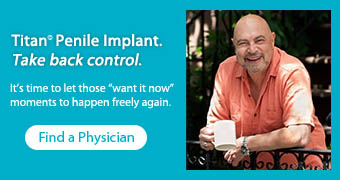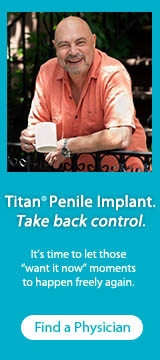how long does the implant last and how long have you had it?
how long does the implant last and how long have you had it?
do you have any hobbies are you running do you work out ball?
Re: how long does the implant last and how long have you had it?
Mike1987a wrote:do you have any hobbies are you running do you work out ball?
This is going to depend on your doctor and the volume of implants he/she does. This has been discussed many times before and a search in the above right will bring up many threads. This is the go to publication for me. https://www.garber-online.com/pdf/Highe ... ctions.pdf Even though it is 10 years old it used a large number of men implanted (14969). If you scroll down to figure 3 you will see the probability of reoperation free survival out to 10 years (120 months). It shows the 4 groups of doctors according to the case volume they do a year.
Injections failed. Implanted 3-21-18 AMS 700 LGX 21 + 1 RTE 100 cc reservoir 6.5" L 5" G Dr. Kramer.
Proximal Perforation Sling Repair 4/13/21 Dr. Broghammer
67 years young.
Will show and tell and talk with others.
Proximal Perforation Sling Repair 4/13/21 Dr. Broghammer
67 years young.
Will show and tell and talk with others.
Re: how long does the implant last and how long have you had it?
Today is my 6th implant anniversary and it's still going strong. I wonder if I'll outlive it.
My wife said if it breaks, I shouldn't replace it. I guess lots depends on that.
My wife said if it breaks, I shouldn't replace it. I guess lots depends on that.
86 years
Inject testosterone weekly.
Implant on 1/22/19 by Dr Avila.
Scrotal, hor. incision just over 1"
18cm AMS 700 CX, 3.5cm RTE 100cc res
Gleason 6 prostate cancer. Monitoring it for now.
Update: On my last biopsies the cancer wasn't found.
Inject testosterone weekly.
Implant on 1/22/19 by Dr Avila.
Scrotal, hor. incision just over 1"
18cm AMS 700 CX, 3.5cm RTE 100cc res
Gleason 6 prostate cancer. Monitoring it for now.
Update: On my last biopsies the cancer wasn't found.
Re: how long does the implant last and how long have you had it?
rafima
how can I take better care of it, how often should I use it? and I didn't understand the graphic how much it usually goes
how can I take better care of it, how often should I use it? and I didn't understand the graphic how much it usually goes
Re: how long does the implant last and how long have you had it?
newbie443 wrote:Mike1987a wrote:do you have any hobbies are you running do you work out ball?
This is going to depend on your doctor and the volume of implants he/she does. This has been discussed many times before and a search in the above right will bring up many threads. This is the go to publication for me. https://www.garber-online.com/pdf/Highe ... ctions.pdf Even though it is 10 years old it used a large number of men implanted (14969). If you scroll down to figure 3 you will see the probability of reoperation free survival out to 10 years (120 months). It shows the 4 groups of doctors according to the case volume they do a year.
There are great takeaways from this paper, despite the stated limitations of this study. Thank you for sharing!
ACV - Annual Case Volume
Top Quartile - Greater then 31 ACV
Kaplan-Meier analysis:
For the >31 ACV group (highest volume): Approximately 94% of patients remain reoperation-free after 10 years.
For the 8–31 ACV group: Around 92%.
For the 3–7 ACV group: About 90%.
For the 0–2 ACV group (lowest volume): Approximately 88%.
Mechanical failure related re-operation:
"We did not observe a relationship between surgeon experience and rates of reoperation for noninfectious complications after IPP surgery."
"The absence of an association between surgeon experience and noninfectious IPP failure is not surprising. Surgeon experience has no impact on the physical mechanical properties of prostheses and, therefore, would not be expected to have an impact on the likelihood of mechanical failure. In addition, we speculate that although lower volume implanters might be more prone to errors in pump placement or device sizing, lower volume implanters might also be less likely to perform a repeat operation in a patient with suboptimal but noncatastrophic IPP outcomes such as glans hypermobility or pump migration."
Median time to reoperation for noninfectious complications was 27.1 months (IQR 6.0-75.0).
Infection related re-operation:
"In terms of absolute risk reduction, patients treated by high volume implanters in the top quartile of ACV were 0.9% to 2.1% less likely to require reoperation for IPP infection."
"Higher volume surgeons work with more experienced operating room personnel, who are presumably less likely to inadvertently contaminate an exposed device, and these teams may be more likely to adhere to stringent procedure protocols that are believed to reduce the risk of IPP infection. Adherence to a set of best practices for infection prophylaxis, such as obtaining a negative preoperative urine culture, has been shown to significantly reduce the risk of IPP infection. Adherence to perioperative antibiotic prophylaxis recommendations and standardization of perioperative antimicrobial therapy might also be better with higher volume surgeons. Furthermore, operative time may also be shorter for more experienced surgeons operating with more experienced teams at higher volume centers, which could result in lower infection rates by minimizing ambient prosthesis exposure."
"The reoperation rate for infection was 4.2% (217 of 5,200) in the era before the routine use of antibiotic-impregnated implants and decreased to 1.5% (126 of 8,209) with the widespread use of antibiotic-coated prostheses."
"Median time to reoperation for infection was 3.9 months (IQR 1.0-25.0)"
40, Coloplast Genesis, 1/2025, Dr. Christine, UCAL
Who is online
Users browsing this forum: AussieGuy81, Google [Bot] and 70 guests







